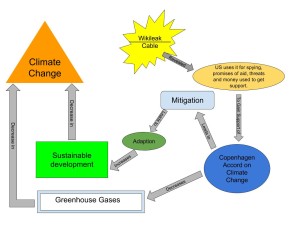The first section in the diagram mention Wikileaks cables (leaked cables revealing communications between US and other countries regarding Copenhagen Accord). These cables reveled how US used unfair means of spying on other countries and then using threats and money to get them on board with the Copenhagen Accord on Climate Change as the treaty was not adopted by the UN but was very beneficial to US in solving a lot of problems specifically regarding cut down in emissions. We can see from the information revealed that US misused its power by bribing other countries especially with offers of financial support and aid to poor countries and if they would still not agree, used spying and blackmailing to get them to agree. Though whatever the means, it was successful in gaining support from both developed(rich) and developing (poor) countries for the accord to pass. At the end there were a total of 140 nations who intended on associating themselves with the accord. The 140 nations represent almost 75% countries that are parties to the UN climate change convention and are responsible for well over 80% of current global greenhouse gas emissions. Now, looking into how Copenhagen Accord had ways in decreasing climate change. The diagram shows two major ways. First explaining how US gained support and then specifies the Copenhagen accord let to decrease in greenhouse gases which then leads to decrease in climate change. Secondly, the Accord also led to forcing all the countries to work together and reduce dangerous threats to climate change for example decrease in pollution creating factories, burning of fossil fuels etc. (mitigation), which then over time would make individuals get used to new atmosphere (adaption), and this new less polluted atmosphere leads to increased sustainable development, hence resulting in decreased climate change. Therefore, all in all, linking the Wikileaks cables to climate change, I would say, even though it revealed the truth of US decreasing trust between countries and misusing its power, it did lead to some decrease in climate change although the change was not very significant.
As the diagram explained the situation and revealed misuse of power, according to me, this issue is a great example of politics and also, a situation where ethics comes into play. As we learnt earlier, I would say US practiced action ethics (took charge of the situation) and decided that the consequences of the actions was more important, making this an example of distributive justice. Also, environmental ethics come into play as anthropocentrism was practiced as every country acted selfishly, agreed to accord for reasons such as money, aid and did not see the problem as a whole and how it was damaging our ecosystem. In my opinion, it was right to leak those cables, as public has the right to know how each country’s government was acting. As we live in a democratic world and cutting down emissions would effect all citizens as well, everyone should at least have had a right to know about the issue if not have a say in it. We’ve learnt that “ With great power, comes great responsibility” and this was definitely demonstrated in this situation. The US misused its power and hence ended up losing its trust over economic gains. We also learn that in order to improve the situation and protect the world from further deterioration by climate change, we need to have a collective action on climate change mitigation. Rather than concentrating on what should’ve been done or as of now looking out for selfish concerns, we should use all the intellectual power we have across the world and come up with something better than Kyoto protocol and Copenhagen accord, and the countries responsible for the most emissions, should definitely work more on this and together we can look forward to a better future. US did wrong somewhere as being the largest in emissions, it should take responsibility for that rather than being selfish, although it did have a slight positive effect as there was a slight change, hence I would say the Copenhagen Accord was bit of a boon but more of a bane.


Hi Akiksha,
I enjoyed the way you expressed yourself. I believe a lot of the same things, including that the cables being leaked were a positive thing. The government looked at the greater harm that was occurring and although a small step, it is a step no the less to helping restore our planet.
Check out my blog post: http://sites.psu.edu/geog30/2016/04/06/module-9-climate-change-carmela-madrigal/?preview_id=53337&preview_nonce=f4bb382f29&post_format=standard&preview=true
Hi, my name is baixue Chen and here is the link to my blog. I hope you can have a look. Your post catch my attention because the diagram is very colorful and creative. I also believed your opinions in second graph that U.S misused its power, and I very like the words you say:”“ With great power, comes great responsibility” It is so true that U.S should take its responsibility as the most powerful country in the world.
http://geog030.dutton.psu.edu/2016/04/06/climate-change-2/
Hi Akiksha,
I love your title and diagram. I think they are both creative.
We both talked about action ethics, ends justifying the means. I think you did a great job answering #3. You included a lot of information and explained yourself well.
here’s my a link to my post: https://wp.me/p3RCAy-dPi
Hello! Your post is so well done! I love how you gave so much detail on your description of your diagram. I agree with your opinions in your second paragraph. I think it was beneficial to leak the cables in order to see the corruption that goes on behind the scenes of these negotiations. It is clear that this is an issue of ethics, and although the United States acted in an unethical way, we can get away with it because we have such global diplomatic influence.
You can read my post here!
http://geog030.dutton.psu.edu/2016/04/06/climate-change-katie-cuerou/